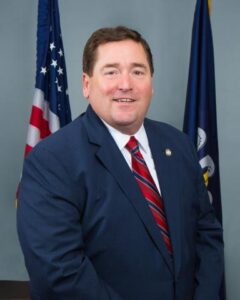The party entices guests with a cornucopia of fine food and drink, two live music stages, fireworks, a new car raffle and a vibe that sets the grounds surrounding the Covington Trailhead abuzz. It’s no wonder Chef Soirée has grown into a household name over the last 35 years, now drawing approximately 3,000 revelers. And while scores of volunteers work tirelessly to create a night of frivolity for guests, the motivation is the ongoing, serious purpose of the beneficiary. The dedicated staff of 30 at the Youth Service Bureau (YSB) relentlessly provide advocacy, counseling, education and intervention for St. Tammany and Washington Parish youth and their families.
“They’re often shocked, angry and confused, never expecting to be in a situation requiring them to talk to us. Drugs and alcohol don’t discriminate.Substance use and addiction can affect almost any family,” says Mary Slazer, YSB President and CEO. Slazer explains that YSB administers many programs: CASA—special advocates for abused and neglected children; TASC addressing truancy; FINS aimed at juvenile delinquency prevention; Crossroads for juvenile delinquency intervention; and Options, which offers outpatient substance abuse treatment for teens.
“Conservative estimates show one in four high-schoolers has experimented with pot. This is regardless of school, religion, gender or any socioeconomic factors—it’s across the board,” continues Slazer. “So chances are, your child or someone they’re close to is in this group.”
YSB Licensed addiction counselor Jennifer Walkenford concurs, “What’s so dangerous is that this isn’t the pot of the 70s and 80s. Today’s strains have tripled in potency. Vape pens are a problem, but dab pens take it to the next level. Two puffs on a dab pen is equivalent to smoking a whole joint. The high lasts up to six hours.” Although dab refers to the amount of wax held in the pen’s small cartridge, that “dab” is 97% hallucinogenic THC. Along with its inconspicuous size, the pen looks like a writing instrument, so it’s easily hidden. And because the smell only lingers for about five seconds, Walkenford says teens can take a puff while walking to the bus in the morning, sneak another on the way home and go in their room at night for a puff before bed. That results in the potential for them to be high all day, every day.
Whether referred by the courts, the school system or self-referred, Walkenford says parents come in to the Options program sometimes blindsided, sometimes aware there was a problem, but always overwhelmed. “Kids can buy drugs from other kids at their school and even from siblings. They’re easy to get, easy to hide, affordable and highly addictive to children whose center of reasoning, their not-yet-developed frontal cortex, is further impaired. With today’s increased strength and frequency of drug use, issues like irritability, fights with parents, loss of friends, declining grades and lack of empathy escalate much more quickly into problems at school and problems with the law.” Even when parents try to talk with their kids, they are often so heavily caught in the cycle, neither parent nor child can use reason to better the situation. “But”, says the passionate counselor, “there is hope.”
Options works to find the child’s internal motivation—for example sports, music or family relationships. Walkenford says the beginning of empathy and reasoning return after remaining sober for about 30 days, and she relays a common scenario. “A star athlete came in conflicted about why they should choose sports over pot. We worked on the motivation that if they didn’t stay on the high school team, they would never progress to a college team forfeiting any hope of a professional sports career. After the family’s completion of the entire 12-week program including individual and group therapy, drug testing and parent education, the student’s grades improved dramatically, they were signed to a collegiate scholarship, and the parents learned to better communicate and bond with their child.”
For other youth who don’t have the lifeline of sports, creative interests or parental help, Walkenford says that often their motivation is to break the cycle of dysfunction. “We teach them to look to themselves, to see their value, develop meaningful relationships and improve academically.” With emotion, her compassion and love shine through as she speaks of those under her care. “These kids are so awesome—we have much success with them, and they fill me with hope to continue doing work that can be very difficult at times. I can’t say enough about this organization and the teamwork and sense of family here. It’s too intense not to support each other in every way. When the parents come back and thank us for saving the relationship with their child, and the kids come back with their success stories—that hope keeps us all going.”
For more information about Youth Service Bureau and its programs and events, call 985-893-2570 or visit ysbworks.com.






